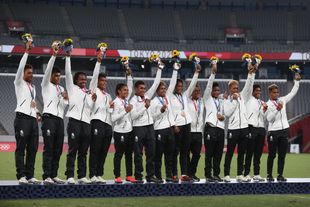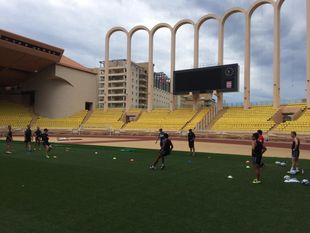History of rugby in the Olympics

Rugby at the Olympics fact file
Rugby sevens
- Rugby sevens made its debut at the Olympics in Rio de Janeiro in 2016. Fiji (men) and Australia (women) became the first Olympic sevens champions. Great Britain and South Africa won silver and bronze medals in the men’s competition, New Zealand and Canada won silver and bronze medals in the women’s
- Rugby sevens returned for a second Olympic Games at Tokyo 2020 games (played in 2021). Fiji (men) retained their gold medal from 2016 and New Zealand (women) won a first gold medal. New Zealand and Argentina took men's silver and bronze, while France took women's silver and Fiji women's bronze.
15s
- 15s was played at four Olympic Games: 1900, 1908, 1920 and 1924
- The following countries became Olympic champions: France in 1900, Australia in 1908, USA in 1920 and 1924
- Overall 15s medals tally:
- France – three medals: one gold and two silvers
- USA – two gold medals
- Great Britain – one silver and one bronze
- Australia – one gold medal
- Germany – silver in 1900
- Romania – bronze in 1924
The founder of the Olympics and rugby
Baron Pierre de Coubertin, the founder of the modern Olympic movement, played, refereed and promoted football rugby as it was called in his day. De Coubertin admired the ethos of the game, its moral values as well as the physical and mental skills required to play it. His biographers mention boxing, fencing, rowing and horse-riding as his main sporting interests. They, however, failed to underline his active interest in football rugby, reflected in a famous essay called Notes about Foot-ball, which he wrote in 1896.
"What is admirable in football (rugby), is the perpetual mix of individualism and discipline, the necessity for each man to think, anticipate, take a decision and at the same time subordinate one’s reasoning, thoughts and decisions to those of the captain. And even the referee’s whistle stopping a player for a ‘fault’ one team mate has made and he hasn’t seen, tests his character and patience. For all that, foot-ball is truly the reflection of life, a lesson experimenting in the real world, a first-rate educational tool."
The Baron was 25 when he visited Rugby School for the first time in 1888. By that time De Coubertin had already read both the works of Thomas Arnold, Rugby’s great headmaster and educationalist, and Thomas Hughes’ novel, Tom Brown’s Schooldays. Arnold's essays and the fortunes of young Tom Brown made a great impression on the young French aristocrat, in search of educational models for his country, traumatised by defeat in the French-Prussian war.
After his return from his first visit to England, De Coubertin became an active promoter of physical education in general and rugby football in particular, which he managed to introduce into several school establishments in Paris, securing the long-term future of the game in the country. He went on playing with his friends in Bois de Boulogne and although there is no information about his rugby prowess, his knowledge of the game was well-respected by his peers, who elected him to referee the 1892 match between Stade Français and Racing Club de France – now regarded as the inaugural French championship.
The French educationalist became one of France's leading promoters of sport in general and rugby in particular, and as such he played a significant role in the formation of the Union des Sociétés Français de Sports Athlétiques (USFSA) and the development of rugby in France.
He was inducted into the World Rugby Hall of Fame in 2007.
1900 Paris Olympics
The fact that no rugby was played in Greece at the end of the 19th century may account for the absence of the game from the inaugural Olympic Games in 1896, but in 1900 De Coubertin succeeded in gathering three teams for the first Olympic rugby competition in Paris: a Parisian selection, representing France, Frankfurt FC representing Germany and Moseley Wanderers, a selection from Midland clubs – the British representatives.
France, captained by the legendary Frantz Reichel (one of De Coubertin’s friends), became the first Olympic champions at rugby by beating Frankfurt FC 27-17 and Moseley Wanderers 27-8 respectively. The match between Germany and Britain did not take place, because the English team, in the true amateur spirit of the day, having travelled to Paris the day before the match (on Saturday), had to return back home immediately after the match.
There is a dispute over whether rugby was an ‘official’ sport in the 1900 Olympics or not, following a subsequent attempt to sift through the numerous sporting competitions of the 1900 Paris Universal Exhibition. Unlike other events or sports which were in retrospect denied Olympic status, rugby football fulfilled all criteria of an Olympic competition: it was international, (three entries France, Great Britain and Germany), was played by amateurs, was not played by motorised means and involved no handicap of any kind.
1908 London Olympics
Not unexpectedly, the American organisers of the St Louis Olympics did not choose rugby as a sport in 1904, but the 1908 Games, held in London, had brought rugby back into the Olympic programme. The number of rugby teams was limited to four in the Olympic programme and the matches were scheduled to be played "in the stadium, about 19 October, 1908. Prizes: Gold Olympic medals to the winning team."
According to the official history of the 1908 Games, South Africa and New Zealand declined the invitation to play in the Olympics, while Ireland, Wales, and Scotland ignored the invitations. "That left England, France and Australia as the only competing teams. England were originally scheduled to meet France with the winners taking on Australia, but one week before the match France withdrew on the grounds that it could not raise a representative team and the two remaining teams, Australia, represented by a team selected from the touring Wallabies, and England, represented by the County champions, Cornwall, met in the only match of the 1908 Games." The Wallabies demolished Cornwall 32-3 in a one-sided match.
At the dinner hosted by the then London RFU at which the Olympic medals were presented, the Wallaby captain, Dr Herbert Moran, replying to the toast given by Sir G Rowland Hill, the RFU President, said: "they were delighted with their reception, but deeply regretted that they had not in the Olympic Games met a side thoroughly representative of the United Kingdom. When they decided to enter, they had hoped that they would conquer or be conquered by the best teams in the world..."
1920 Antwerp Olympics
Rugby was absent from the Olympic programme in 1912, but after the Great War, it re-emerged as an Olympic sport at the 1920 Games in Antwerp. The Home Unions did not take part, arguing that the event held in September was too early in the season to enable the British to compete on equal terms with the other teams. The Romanians and Czechoslovakia withdrew at the last moment, which left the USA, represented by a team of Californian students, and France as the only two participants.
The USA, coached by former Wallaby winger Daniel Carroll, at the time a student at Stanford University in California, surprised the French with the vigour of their game and the precision of their defensive work and won the match 8-0. Daniel Carroll became rugby’s first Olympic double gold medallist.
1924 Paris Olympics
The 1924 Olympic rugby competition commenced on the opening day, 4 May, with the match between hosts France, by that time seasoned Five Nations campaigners, and Romania, newcomers at international level and making their maiden Olympic appearance. Not unexpectedly, the French dispatched the newcomers from Eastern Europe by a record margin of 61-3 – according to some sources the score was actually 59-3 – scoring a record 13 tries in the process. The walkover win must have given the French players and public a sense of invincibility and high expectations, exacerbated by an intense and partisan media campaign.
On the following Sunday, 11 May, the US team comprehensively defeated Romania, at Stade Colombes, though the Romanians defended gamely and managed to limit the score to 39-0, with the Americans scoring only eight tries. The defeat ended Romania’s campaign in the Olympics, but secured them the bronze, their first-ever Olympic medal. The Olympic final was played at the same Stade Colombes in Paris on 18 May before a strongly partisan crowd of about 50,000. The Americans surprised their hosts and the crowd with their pace, skill and tackling and won 17-3, scoring five tries to France’s solitary effort.
1928 Amsterdam Olympics
In 1925, Baron de Coubertin stepped down as the President of the IOC and his successor, Count Baillet-Latour, did not share the enthusiasm of the founder for rugby football. The 1925 Olympic Congress, at which Baillet-Latour was elected as the second IOC President, signalled the beginning of a drive against team sports and despite the vigorous protestations of the Dutch students keen to have rugby in the ninth Olympic Games in Amsterdam, rugby was dropped from the Olympic programme.
Rugby was never again part of the Olympic Games, though its American Football cousin appeared as a demonstration sport at the 1932 Olympics in Los Angeles. It was the last time an oval ball featured in the Olympic Games, though a pre-Olympic rugby tournament involving France, Germany, Italy and Romania was held in Berlin before the 1936 Olympics.
The 1990s
Rugby expanded its reach around the globe and didn’t really begin to re-focus on the Olympics until the early 1990s, when efforts began to reunite the two movements with a series of informal meetings between the World Rugby – then known as the International Rugby Board – Secretary, Keith Rowlands, and the British Olympic Association Secretary, Dick Palmer. In 1994, when Vernon Pugh QC of Wales was elected Chairman of World Rugby, the march towards Olympic recognition began in earnest. Pugh convinced the World Rugby Council that Olympic membership – initially as a non-participation sport – would be beneficial to rugby and offer its member unions membership to their National Olympic Committees.
Many European federations, including the likes of France, Italy and Romania, had been members of their National Olympic Committees for decades. The fact that membership to the national Olympic bodies has been beneficial for rugby in these countries is well documented. The demand to get rugby back in the Olympics mounted as more rugby nations from Africa, Asia, Oceania and Americas joined World Rugby. The pressure was particularly strong in North America were the USA are the reigning Olympic champions.
A significant step in the process of acceptance back into the Olympic Movement was achieved at a ceremony held in Cardiff in November 1994, when World Rugby was officially confirmed as a Recognised International Federation of the IOC. At that ceremony, International Olympic Committee President, Juan-Antonio Samaranch, pointed out that rugby's history and values were very much in tune with the Olympic philosophy and traditions. This historic meeting in Cardiff led to World Rugby representation at annual IOC meetings and consideration for inclusion in the programme of future Olympic Games.
The 21st century
The global development of rugby through the rapidly increasing number of unions affiliated to World Rugby and the explosion in participation and support for both the 15s and sevens disciplines of the game cannot be denied over the last 100 years. This rapid growth reflected growing awareness and support for rugby within the Olympic Movement, culminating in a recommendation in 2001 from the Olympic Programme Commission to the IOC Session, that rugby sevens be included in the Beijing 2008 Olympic Games.
While World Rugby had proposed the inclusion of either rugby sevens or 15s, it was the Olympic Programme Commission that recommended rugby sevens as it felt this fast-paced youthful version of the game was best suited to the multi-sport environment, as has been proven by the huge success of sevens in both the Commonwealth and Asian Games, where it is now a core sport. Unfortunately, the recommended modernisations to the programme were not carried through but that did not stop World Rugby from carrying on in its quest for rugby’s inclusion in subsequent Games.
Dr Syd Millar of Ireland, who succeeded Pugh as World Rugby Chairman, continued the campaign for Olympic admission with increased vigour. World Rugby’s efforts reflected the global views of world rugby, leading to its inclusion in further IOC reviews for the London 2012 Olympic Games in 2005. Although rugby was shortlisted for consideration in the Olympic Programme, the IOC again decided not to introduce new sports and the goal of becoming an Olympic sport remained tantalisingly out of reach.
The newly-elected World Rugby Chairman, Bernard Lapasset of France, made the readmission of rugby into the sporting programme of the Olympic Games one of his top priorities.
Following a concerted campaign by World Rugby, its member unions, regional associations and the global rugby family, rugby made the shortlist of potential sports for inclusion on the Summer Olympic Sports Programme.
At the 121st IOC Session in Copenhagen on 9 October, 2009, IOC members voted overwhelmingly in favour of rugby sevens’ inclusion on the Olympic Games Sports Programme for 2016 and 2020, 81 votes in favour with only eight against.
This historic achievement meant that the world's top men’s and women's rugby players would now have the opportunity to compete for an Olympic gold medal, the pinnacle of sporting achievement, firstly in Rio de Janeiro and then in Tokyo.
2016 Rio Olympics
Rugby sevens seized its opportunity to inspire and engage an international audience on its Olympic debut in Brazil, with some thrilling matches played in a manner which embodied the Olympic ideals of friendship and fair play.
Twenty-four teams from all corners of the globe gathered together on sport’s biggest stage. Hosts Brazil were joined in the men’s competition by Argentina, Australia, Fiji, France, Great Britain, Japan, Kenya, New Zealand, South Africa, Spain and the USA. The line-up for the women’s competition was very similar, but featured Colombia and Canada instead of South Africa and Argentina.
Fiji won their first Olympic medal of any colour in defeating Great Britain to win the men’s competition, while Australia’s women finished on top of the podium at the expense of New Zealand in front of an equally captivated crowd at the Deodoro Stadium.
As the dust eventually settled on six unforgettable days of rugby sevens, the impact of Olympic inclusion became clear – it was a transformational moment with an estimated 30 million new fans having been attracted to the game thanks to the exposure of Rio 2016.
In September 2017, as a further endorsement of the sport’s impact in Rio, it was announced that rugby sevens would be retained when Paris hosted the Games in 2024. The programme for the 2028 Games in Los Angeles is not set to be finalised until after the Tokyo Games.
2020 Tokyo Olympics (played in 2021)
After a successful first competition in 2016, rugby sevens returned in 2021 for the Tokyo Games where 16 nations competed across the men's and women's competitions, each of which featured 12 teams. The participating nations were Argentina, Australia, Brazil, Canada, China, Fiji, France, Great Britain, Ireland, Kenya, Japan, New Zealand, ROC, South Africa, South Korea, USA.
In the men's competition, Fiji went unbeaten in pool play against Great Britain, Canada and host nation Japan and eventually played great rival New Zealand in the final, running out 27-12 winners. The losers of the two semi-finals were Great Britain and Argentina and they played off for the bronze medal with the Argentines winning 17-12.
In the women's competition, New Zealand were unbeaten in pool play against Great Britain, ROC and Kenya and went on to play France in the gold medal match, winning 26-12. The losing semi-finalists Fiji and Great Britain played for bronze with the Fijians capturing a prized medal with a 21-12 victory.






